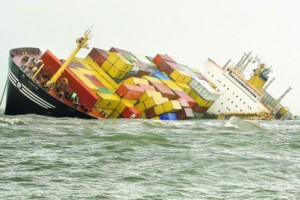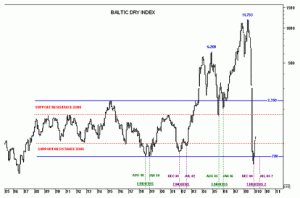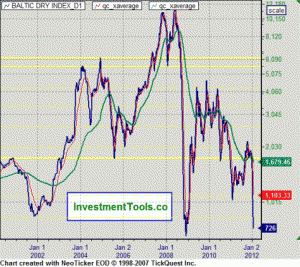There is No Real Recovery in Economy
 If the economy was doing so well, the Federal Reserve would not be announcing (last week) an extension of its zero interest rate policy until the end of 2014. If the economy was truly in a real recovery the Fed would be hiking interest rates instead of giving away money for virtually nothing. It is just not the U.S. that is doing badly, but the rest of the world is also tanking. Just look shipping traffic around the globe. Today’s guest writer, Brandon Smith from Alt-Market.com, does just that in a new post that takes an in-depth look at the Baltic Dry Index. This mainly measures international shipping and the news is not very good. Please enjoy the excellent post below. –Greg Hunter—
If the economy was doing so well, the Federal Reserve would not be announcing (last week) an extension of its zero interest rate policy until the end of 2014. If the economy was truly in a real recovery the Fed would be hiking interest rates instead of giving away money for virtually nothing. It is just not the U.S. that is doing badly, but the rest of the world is also tanking. Just look shipping traffic around the globe. Today’s guest writer, Brandon Smith from Alt-Market.com, does just that in a new post that takes an in-depth look at the Baltic Dry Index. This mainly measures international shipping and the news is not very good. Please enjoy the excellent post below. –Greg Hunter—
————————————————————————————-
Baltic Dry Index Signals Renewed Market Collapse
By Brandon Smith
Guest Writer for USAWatchdog.com
Much has been said about the Baltic Dry Index over the course of the last four years, especially in light of the credit crisis and the effects it has had on the frequency of global shipping. Importing and exporting has never been quite the same since 2008, and this change is made most obvious through one of the few statistical measures left in the world that is not subject to direct manipulation by international corporate interests; the BDI. Today, the BDI is on the verge of making headlines once again, being that is plummeting like a wingless 747 into the swampy mire of what I believe will soon be historical lows.
The problem with the BDI is that it is little understood and often dismissed by less thoughtful economic analysts as a “volatile index” that is too “sensitive” to be used as a realistic indicator of future trends. What these analysts consistently seem to ignore is that regardless of their narrow opinion, the BDI has been proven to lead economic direction in the market movements of the past. That is to say, the BDI has been volatile exactly BECAUSE markets have been volatile and unstable, and is a far more accurate thermometer than those that most mainstream economists currently rely on. If only they would look back at the numbers further than one year ago, they might see their own folly more clearly.
Introduced in 1985, the Baltic Dry Index first and foremost is a measure of the global shipping rates of dry bulk goods, mostly consisting of vital raw materials used in the creation of other products. However, it is also a measure of demand for said materials in comparison to previous months and years. This is where we get into the predictive nature of the BDI…
In late 1986, for instance, the BDI fell to its lowest level on record, then, began a slow crawl towards moderate recovery, just before the Black Monday crash of 1987. 
Coincidence? Not a chance. From 2001 to 2002, a similar sharp collapse in the BDI preceded a progressive drop in the Dow of around 4000 points, ending in a highly suspect (Fed engineered) illegitimate recovery. In 2008, the index fell to near record lows once again just before the derivatives and credit crisis hit stocks full force. To imply that the BDI is not a useful measure of future economic trends seems like an astonishingly ignorant proposition when one examines its very predictable behavior just before major financial downturns.
This is not to suggest that the BDI can be used as a way to play the stock market from day to day, or often even month to month. MSM analysts rarely look further than the next quarter when considering any financial issue, and that is why they don’t understand the BDI. If an index cannot be used by daytraders to make a quick buck in a short afternoon, then why bother with it at all, right? The BDI is not an accurate measure of the daily market gamble. It is, though, an accurate measure of where markets are headed in the long run and under extreme circumstances.
Over the course of the past month, the BDI has fallen around 65% from above 1600 to 726. Mainstream economists argue that the BDI’s fall in 2008 was a much higher percentage, and thus, a 65% drop is nothing to worry about. They fail to mention that shipping rates never recovered from the 2008 collapse, and have hovered in a sickly manner near lows reached during the initial credit bubble burst. By their logic, if the BDI was at 2, and fell to 1, this 50% drop should be shrugged off as inconsequential because it is not a substantial percentage of decline when compared to that which occurred in 2008, even though the index is standing at rock bottom. Yes, the useful idiots strike again…
Looking at the rate and the speed of decline this past month, it’s hard to argue that the current 65% drop is meaningless:
Another subversive argument against the BDI is the suggestion that it is not the demand for raw materials that is in decline, but the number of shipping vessels out of use that is growing. A smart person might suggest that these two problems are mutually connected. An MSM pundit would not.
In 2008, many ships were left to wallow in port without cargo, but this was due in large part to two circumstances. First, demand had fallen so much that too many ships were left to carry too little raw materials. Second, credit markets had sunk so intensely that many ships could not find trade financing necessary to take on cargo. In either case, the BDI still falls, and in either case, it still signals economic danger. The only way that the BDI could signal a major decline in shipping demand artificially or inaccurately is if a considerable number of ships under construction were suddenly released onto the market while there is no demand for them. There have been no mass increases or extreme changes in cargo fleets this past month, or at all since 2008, which means, the BDI’s decline has NOTHING to do with the number of ships in operation, and everything to do with decline in global demand.
What is the bottom line? The stark decline in the BDI today should be taken very seriously. Most similar declines have occurred right before or in tandem with economic instability and stock market upheaval. All the average person need do is look around themselves, and they will find a European Union in the midst of detrimental credit downgrades and on the verge of dissolving. They will find the U.S. on the brink of yet another national debt battle and hostage to a private Federal Reserve which has announced the possibility of a third QE stimulus package which will likely be the last before foreign creditors begin dumping our treasuries and our currency in protest. They will find BRIC and ASEAN nations moving quietly into multiple bilateral trade agreements which cut out the use of the dollar as a world reserve completely. Is it any wonder that the Baltic Dry Index is in such steep deterioration?
Along with this decline in global demand is tied another trend which many traditional deflationists and Keynesians find bewildering; inflation in commodities. Ultimately, the BDI is valuable because it shows an extreme faltering in the demand for typical industrial materials and bulk items, which allows us to contrast the increase in the prices of necessities. Global demand is waning, yet prices are holding at considerably high levels or are rising (a blatant sign of monetary devaluation). Indeed, the most practical conclusion would be that the monster of stagflation has been brought to life through the dark alchemy of criminal debt creation and uncontrolled fiat stimulus. Without the BDI, such disaster would be much more difficult to foresee, and far more shocking when its full weight finally falls upon us. It must be watched with care and vigilance…
You can contact Brandon Smith at: [email protected] His web site is Alt-Market.com.













Mr. Hunter I’ve been reading your articles for a few months now, and I must say though they are quite informitive and helpful. I would like to thank you for being honest and writing about the truth in the current mainstream’s sea of bias.
p.s. What is the scandal you keep mentioning as a precedent for arresting current wall street bankers for fraud? I’m curious about the details. Could it be the S&L scandal from a two decades ago?
Sorry if this is off topic from the current article.
Future Voter,
Mortgage application fraud in issuing “liar loans.” The packaging the “liar loans” into mortgage-backed securities. Foreclosure fraud for by way of fabricating and forging necessary documents to take back homes. Pick one. This was done on a scale the country and the world has never seen and no financial elites have been put in jail for the many crimes committed. This is what I keep referring to.
Greg
Thank you for responding. Many of the terms (economic and political) I read about and the ones you mentioned are still new and complex to me. However, I will use what you have said here to futher research the subject and be more informed in the future.
And as others have said before, good article.
FutureVoter,
Hang in there FV. This stuff is complicated even for me! I try to write this stuff for non Wall Street wonks (like myself.) I try to decipher all the noise and write one sharp clear post on what’s going on. I am not sure I always hit the mark. Thank you for supporting and reading this site.
Greg
FutureVoter, the documentary “Inside Job” is a great place to start your research. It’s educational, objective and presented in a straight forward manner that articulates the issues clearly.
Baja,
Great advise!!
Greg
Nice article Greg, thanks for posting it as I learned allot. Especially what jumped out at me after reading it was the economic term “stagflation”. Holly molly I new around here it was in play, you can see it everywhere with products (commodities) such as food, gas & the such increasing in price but no wage increases, etc. You know Greg and fellow bloggers you can sense and or feel dark times are on the horizon and Mr. Smith’s BDI analysis is insightful. History records all dark times were foretold by prior events, or indexes if you will, if only the ones living at the time would let their eyes see and their mind expand to rational thought. The BDI is not the only indicator predicting a massive downturn, its in most places if one only looks closely at the “index” with a rational mind.
A very interesting and informative piece, Greg.
Another very good and must listen to interview is this one with Jim Sinclair talking about the ISDA (International Swap Derivative Association)
Sinclair explains everything you need to know in 20 minutes. Scary, but a must listen to.
http://www.jsmineset.com/
NM,
I put it up under “Hunter’s Top Stories.” This a shocking charge form a real market maker and expert!!! Thank you.
Greg
Greg and Brandon,
This is a very interesting article. Thanks for identifying this index. I had not heard of it before. It seemd to be a good indicator of things economic to come, on a global scale.
I use the PISI (Personal Individual Situation Index) and find that the PISI identifies the local economic situation very well. I have lost my job, my house, and have hundreds of thousands in medical debt. The local economy has an unemployement rate of 29+ percent with no way to turn around. People here are losing their homes at the rate of hundreds each year.
Now that’s PISI.
However, I shall overcome! While I am in this economic slump, I am trying a new venture. I am writing children’s books. If they are popular enough, they will lead to consumer products and farther down the road a theme park.
The new company will be a “Family business for families”. That is my economic recovery plan.
I enjoyed learning about the BDI and it’s economic predictabilty factor. It appears to be a good signal of things to come. Thanks Brandon and as usual; thanks to you Greg for the education.
Thank you Chuck for the nice comment.
Greg and Brandon
Hard to disagree with the inferences and/or the conclusions of this post; quite dire really. Putting aside the US and Euro mess, it certainly refutes a China soft landing and certainly might put the last nail in the Japanese coffin. And yet the propagandists are still out in force proclaiming a recovery, or at worst a “muddling through”. No wonder “they” want to shut down the internet.
only war can stave off the collapse of the dollar while the elite reorganize their fiscal fifedom…..
inflation is the order of the day and it will steal our wealth like a thief in the night. The people are just beginning to catch on the the inflation and central banks game … the revolt is near … if it is not done at the ballot box it will be done by the gun…..
–
Some recent posts on this very subject appear here
http://crowlee.proboards.com/index.cgi?action=gotopost&board=dailydenarius&thread=329&post=11126
and for the three posts following in the topic.
–
“the monster of stagflation has been brought to life through the dark alchemy of criminal debt creation and uncontrolled fiat stimulus.”
What a great line. Not sure about the “criminal debt creation” part or the “uncontrolled fiat stimulus” bit, but still, a great line.
May I quibble? Debt creation is what Congress does. Whatever the Congress’ fiscal policy may be (feckless, pimping to the special interests?), it cannot by definition be criminal.
Fiat stimulus is what the Fed is trying to do. Uncontrolled it is not: There is damn little demand for credit; probably the Fed wishes its stimulative measures were so successful as to appear uncontrolled. The Fed is fighting the truly scary monster of Depression, conjured mostly be the deflation of American wages.
What is overlooked by those who bewail the “private” Fed is the fact that the bulk of money creation during the first decade of this century was accomplished by truly private entities, such as the credit card companies, the purveyors of “liars’ loans,” the issuers of corporate debt, etc. One economist estimated that only about 25 percent of money supply creation during that period could be attributed to the Fed.
Commodities prices remain high (when, ostensibly, they should not be) for a number of reasons: because of production restraints (i.e., war and civil unrest), diversion of food crops for fuel (40% of the US corn crop goes to ethanol, for example), derivatives speculation, and a shrinking base of natural resources. Yes, also “stimulative” monetary policy around the world. And quite likely market manipulation as well (see “war and civil unrest”).
These are complex, interrelated mechanisms of global scale, and not susceptible to control by any one central bank or legislative body. It is fashionable at the moment to ascribe more power to the various actors than they actually have. Really, they are like the engineers on a runaway train — pulling their puny levers and hoping the passengers don’t scent their panic.
Good stuff anonymouse!
Greg
I would take exception with your statement that credit card companies et al create money supply. They can only do this if the Fed allows it. The Fed is the ultimate regulatory agency overseeing the banking industry and no money is created without the Fed’s creating it. They are, after all, Federal Reserve Notes. Not Visa Card notes.
And again, if not for the Fed buying Treasury notes and setting artificially low interest rates, the debt creation of Congress would be limited to the amount the free market would purchase, and the pressure of a freely established, market based interest rate would act as a restraint towards excessive debt creation.
I would take exception with your exception. Credit card companies, finance companies, et al, are not regulated by the Fed; their standards and practices are governed by state and federal statutes. The capital they leveraged came from (mostly foreign) private investors. The Fed can only buy debt authorized by C0Ngress; it doesn’t create debt (since it prints the money there’s no debt involved for the Fed itself). The CONgress, on the other hand, can create debt up to the limit set by itself. You are correct that the Fed’s ability to print means pure market forces are not the final arbiters of interest rates on that debt. And that’s a good thing for US taxpayers. Also, do not overlook the fact that, alone among “private” firms, the Fed remits 94% of its profits (from seigniorage) to the US Treasury.
I think it’s ironic that the Fed as an institution was created through a deal between the NY bankers and Progressive Democrats; the former wanted more stability in the banking system while the latter wanted to dump the Gold Standard, which was perceived to be unfair to their constituents — farmers, small businessmen and the middle class in general. (As a bonus, the populists also got a tax on the incomes of the ultra-rich out of the deal.) The irony is the Fed is now reviled by the populist descendants of the very same people who supported its creation.
At the end of the day, public debt is a creation of our spendthrift CONgress. Since this is an elected body, we can ultimately blame only ourselves for the mismanagement of public finances. (Unless you are a Libertarian, in which case you get a free pass to blame EVERYBODY ELSE.)
Greg, from a person who does not or has never played in the stock markets, even I was awawre of the BDI because of my time in the U.S. Navy working in supply management. I remember seeing cargo ships leaving Long Beach CA. empty in the 70’s. We know what happen back then, also in 2007-to date! Brandom Smith is right with his report. The fed has kept the stock markets alive so the 5 wall street banks can make money from nothing while main street suffers.
MF Global was a out right default, but if Greece makes a deal where bond holders take a haircut of say 30% or 50% the ISDA paints it another way, you should listen to Jim Sinclair’s late night release about the ISDA & the 5 wall street giants(1/30/2012). Again no where in the U.S. MSM has it been even brought up, why? If you follow Armstrong’s 2012 releases, you will understand why the MSM keeps such reports from the public, the herd must be controled. I went on ISDA.org web site & found it to be way above my head as undestanding what they really do besides hide the truth. I am sure there will be many who know what is really about to happen even in the MSM, but it will be white washed so to keep the herd from bolting out of control.
The U.S. military build up all over the MENA region is being joined by many NATO nations. Iran took steps to ship oil to China, Japan, S.Korea & this has made the White House & EU look like a bunch of fools. There is a plant locaated close to Jackson,TN that makes vital parts for all missels used by the U.S. & NATO, a worker told me they have startd a new line to run with the one that runs 3 shifts 24/7/365 a yr. He said this increase has put a strain on his family life because they won’t hire new workers except for the new line, I worked at that plant it the noise alone is enough to drive you nuts, much less the long hours of repeditive doing the same thing day in & day out. When I worked there, we rotated to a different department so if needed you could stand in for some one who needed time off, but no longer, it’s about profits. If the increase of the metal they use goes up, so does the use of silver & REM’s! Kiasier Alumium has been the main supplier for these parts for as long as I remember going back when I was in the Navy. Look for a huge increase in the need for SILVER by the War Machines!
http://www.silverbearcafe.com/private/01.12/onion.html. Now this is a eye opener, what the hell are we voting for? This says alot about the corruption in the voting system! It blew me away, I thought this was joke, but seems to be real? If so we should ask/demand for a paper ballet that is hand counted with CVTV’s recording every ballet cast, it might take longer, but it sure beats the hell out of some corporation decicing who wins!
Greg, I hope people will see this as no movie!